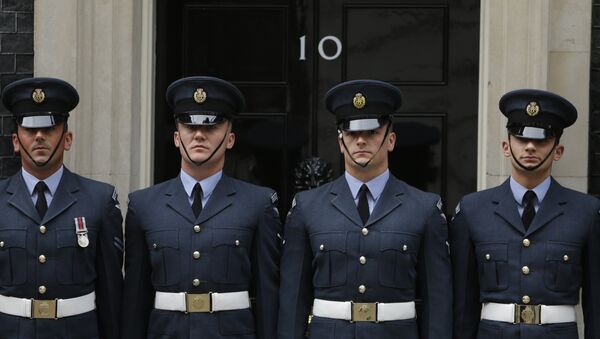The Commons Defense Committee has urged the UK officials to move towards the spending benchmark of 3% of GDP, "which the United Kingdom still maintained as late as the mid1990s."
The lawmakers see the move to the 'end of the Cold War' period spending as the way to keep the UK safe from the "security challenges posed by Russia" and across all five domains — maritime, land, air, cyber and space.
"Throughout the Cold War years of the 1980s, we spent between 4.3% and 5.1% of GDP on Defense; and even in 1995-96 we were still spending fully 3% on keeping our country safe," the paper says.
The report named Beyond 2 percent, says the Ministry of Defense's Modernizing Defense Programme (MDP) must be fully funded to effectively address the challenges presented by the "resurgence of state-based threats," to which "Russia is central." Common to the UK government rhetoric on "Russian State aggression" and Salisbury attack was used in the report, followed by the recommendation of bigger cash injections in British defense infrastructure.
Main Domains
The most serious maritime issue described by the report is the need for greater anti-submarine warfare (ASW) capacity. The paper cites the UK Defense Minister Gavin Williamson who has "described how Russian submarine activity in the North Atlantic has increased tenfold in recent years." Since assuming his post in November 2017, Mr. Williamson has been calling for strengthening the UK submarine fleet, citing the alleged surge in the Russian submarine activity near UK shores. Moscow, in turn, has repeatedly denied accusations of posing a threat to Western countries, calling them unfounded.
READ MORE: UK to Invest 2.5Bln for Submarine Construction — Defense Secretary
"ASW is a complex and resource-intensive exercise, and the world-leading capability which the UK maintained in the Cold War has been substantially reduced," the report says.
The Defence Secretary proudly named the 7th Astute Class submarine, HMS Agincourt this morning. The Astute Class are the largest, most advanced and most powerful attack submarines ever operated by the @RoyalNavy 🔗: https://t.co/ZGUtiJwAw3 pic.twitter.com/onQe5iVM3n
— Ministry of Defence 🇬🇧 (@DefenceHQ) May 14, 2018
On land, the lawmakers suggest the target strength of the Regular Army should not be reduced below 82,000 personnel.
On air defense, they called for a layered air defense system, noting that the UK has no substantial missile defense capability.
The report also noted the significance of space-based technology for UK's communications, navigation and surveillance purposes.
"… the new challenges in space must be reflected in the next generation of capability, including the design of the Skynet 6 military communications satellite. Use of low-cost microsatellites, such as the recently launched Carbonite-2 should also continue to be pursued," the lawmakers suggested.
Lift-off: Satellite launched into space on RAF mission. govt.
— GovWire (@gov_wire) March 1, 2018
More: https://t.co/ehTAuuO80a pic.twitter.com/BxTh613zaf
MoD's Cyber Vulnerability Investigations program — aimed at defending UK cyberspace — is too focused on identifying cyberrisks rather than neutralizing them, the paper also reported. It went on with a reference to Russia possessing "very strong jamming capabilities-broad-brush jamming-across the whole electromagnetic spectrum."
Defence Minister Mark Lancaster says the MOD is “strengthening our defences against increasingly sophisticated attacks” with a £265 million investment in the Cyber Vulnerability Investigations programme and £40 million for Cyber Security Operations Capability #DefenceOrals pic.twitter.com/YkmQRZG5yD
— Ministry of Defence 🇬🇧 (@DefenceHQ) June 11, 2018
Britain's Foreign Minister Boris Johnson, as well as the Defense chief Gavin Williamson, have cautioned in the past of the supposed cyber threat posed by Russia. Such speculations were criticized by the representative of the Russian embassy to the United Kingdom, who called them "a reckless, provocative and unfounded policy against Russia."
READ MORE: Beware the Russians: British Boogeyman Recipe to Making Strong Points
"The Government now needs to look beyond the two per cent minimum on Defense spending, and begin moving towards a figure of three per cent, to place our defense policy on a sustainable basis to meet new threats and fill existing financial 'black holes'. Defense is constantly described as the first duty of government. The MDP is the government's opportunity to show that it means what it says," Dr. Julian Lewis, Defense Committee chairman, said.


